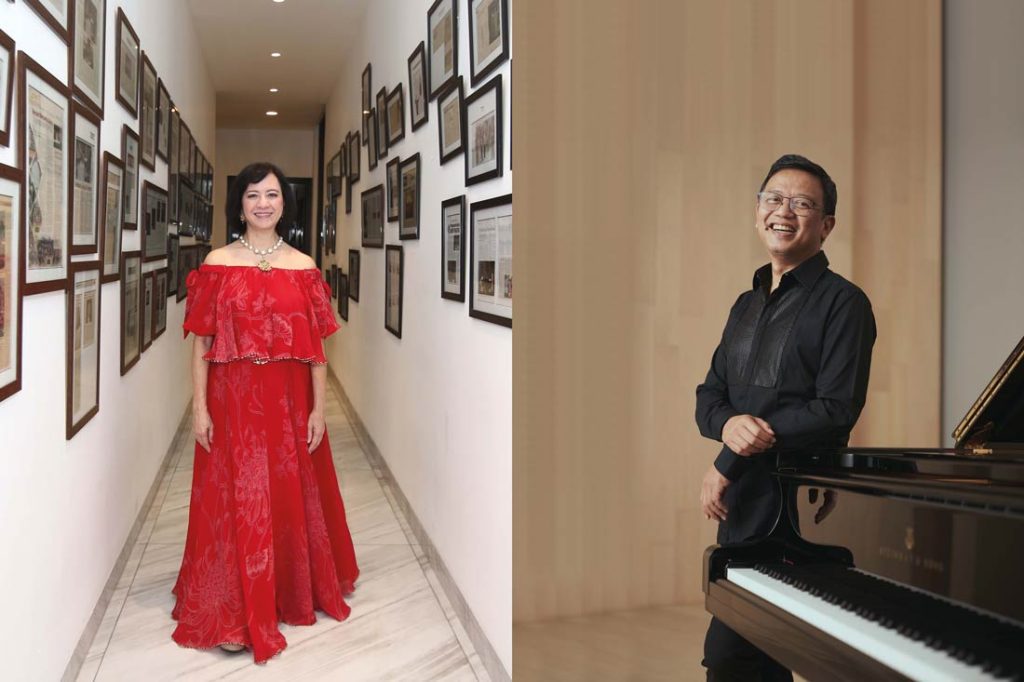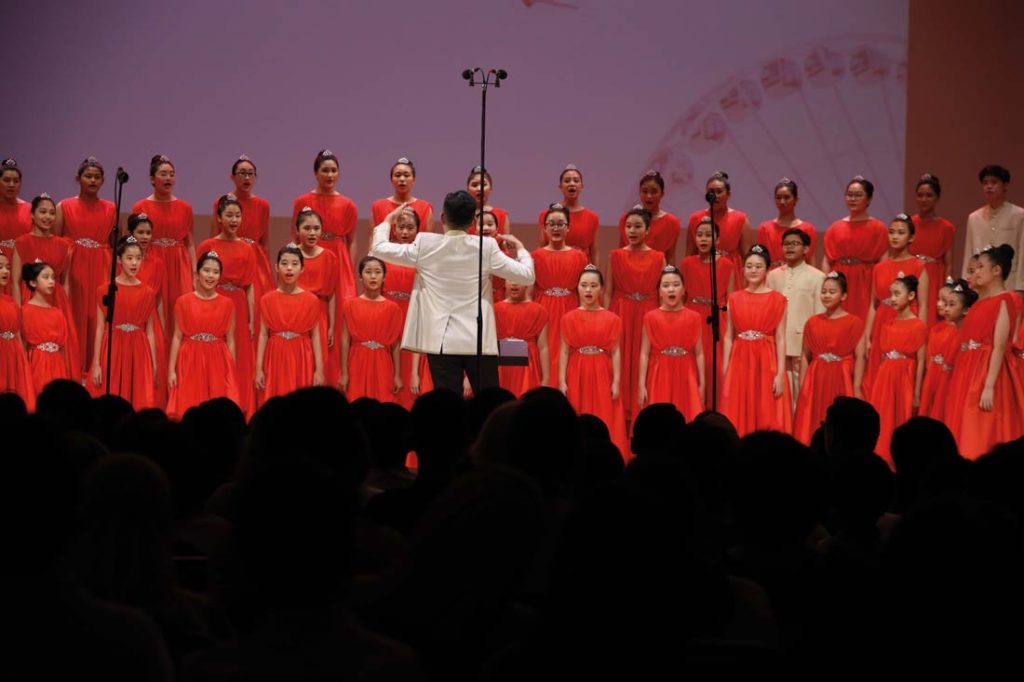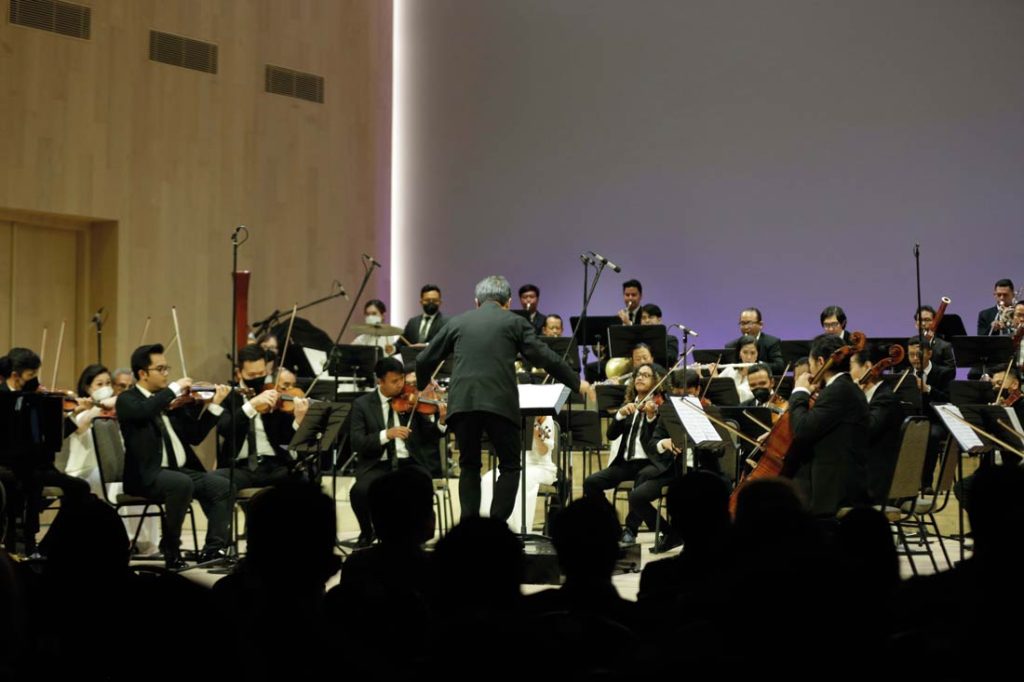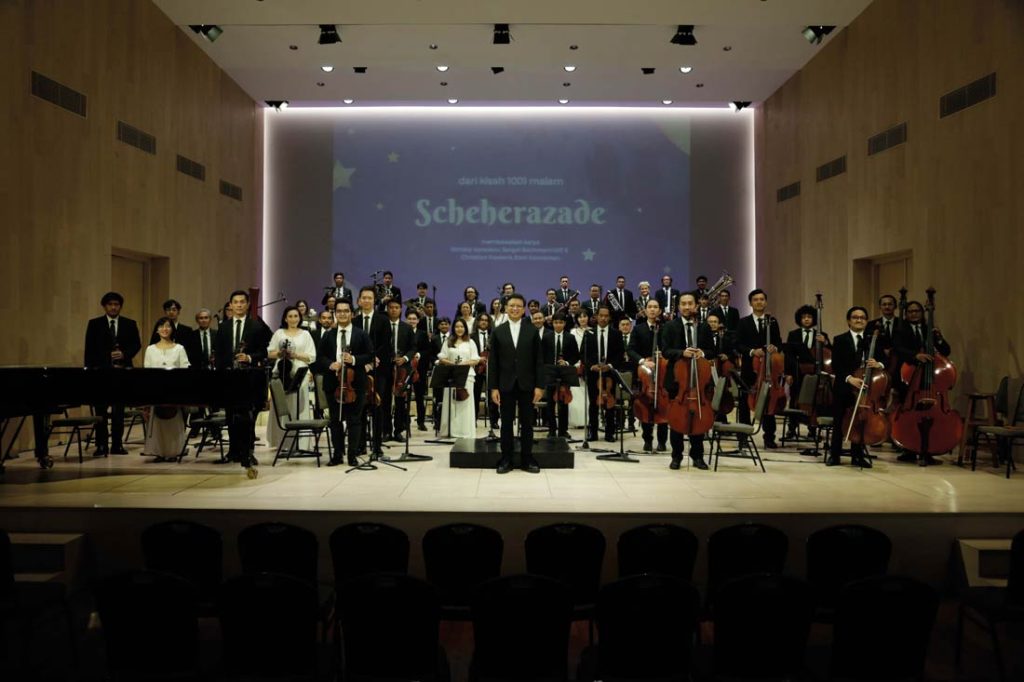
NOW! Jakarta speaks to Ibu Giok Hartono and Avip Priatna of The Resonanz Music Studio, who share about the musical arts in Jakarta and Indonesia.
For those of you keyed into Indonesia’s music world, there will be names that you know. Avip Priatna (AP) is certainly one of them, a highly celebrated conductor, and Director of The Resonanz Music Studio. However, there is also a lady behind the scenes, a passionate supporter of the arts who has helped to create this portfolio of musical genius, boosting Indonesia’s classical music scene enormously: Ibu Giok Hartono (GH).
I have been lucky enough to go to many fantastic concerts organised by this amazing duo: Avip out in front of the orchestras and choirs; and Ibu Giok Hartono organising and inspiring off-stage. Here I am lucky enough to speak to both of these key figures in Jakarta’s cultural scenes, as they share what it means grow, uplift and develop the arts.
AGS: I love what you’ve done. You have a wonderful portfolio of musical talent across the Jakarta Concert Orchestra, the Batavia Madrigal Singers, the Rezonance Childrens Choir and the supporting facilities you’ve developed. How did it all start? Whose idea was it and how did it develop?
GH: Well of course it was Avip’s idea for the Madrigal Singers. He had this group of singers from university and he started to build it until it became so famous! But for the children’s choir, it started with some companies that wanted to hire a children’s choir, but we didn’t have a children’s choir at that time. But my grandchildren love singing and they were studying and learning singing from Pak Avip. And so we decided, why not? We invited some of their friends to join and from this, the children’s choir got started.

AGS: So Avip, you are the originator of the idea for The Madrigal Singers and the Jakarta Concert Orchestra. But how did you actually get it started? It is such a huge undertaking.
AP: This is actually my dream. It was my dream when I studied in Vienna, and at the time, I also conducted the University Choir, and I watched so many good choirs there, which were at a very, very high standard. Of course, at that time, our standards were not there yet, and my dream was that I wanted to have a choir of that quality: consistent with the program that they have, with regular concerts and regular performances. Their repertoire is very challenging.
Then at the same time, my friends, who just finished studying at the Catholic University in Bandung, moved to Jakarta and wanted to continue singing in a choir. So, they asked me to make a new choir in the city that they could join. Since this was our dream, we met, and we just made a new choir, starting with a very small group. It was only twelve people. At first, we named it Batavia, the old name for Jakarta. And then with the same impression that our songs were more classical, more Renaissance music from the 16th and 17th centuries, we named it the Madrigal Singers. In the first concert that we had, we performed in English.
This is the history of the choir. And later when I finished my study in Vienna in 1999, I felt that 12 singers were not enough, so we opened auditions to the public, not only the alumni of the Parahayangan University Choir. Since then we almost have a hundred singers.
In 1999, I also met Ibu Giok Hartono. She also had a dream to have an orchestra, so together we founded The Jakarta Concert Orchestra — at the time it was called The Jakarta Chamber Orchestra as it start with less than 30 players. After seven or eight years, we began playing repertoires that required more players, like symphonies, that’s why we changed the name: it became a concert orchestra. Now, it’s not only classical music that we play, we wanted to make the orchestra more flexible with a repertoire that included Indonesian music that we arranged for a symphony orchestra performance.
That’s why we choose the name concert, meaning that the repertoire is very flexible, not only classical but popular music, adding variety. And then me and Ibu tried to spread to our fans, not only classical music, but also other genres of music. That’s why in our program, in a year we have three concerts: one for classical, then one for only Indonesian composers. And the last is very light, like movie themes or maybe like Queen.

AGS: That has been a very successful model. I went to the Queen, the Beatles and the Hollywood movies concerts and people were absolutely delighted by that. And I think probably the same people who like your classical concerts? They transfer with you because of your style, it’s very well done.
But, you make it sound very simple. “We started with 12 people, we’ve added more.” Expansion needs funding! That’s the bit of the development which is the most difficult, isn’t it? When you try to recruit good people, how do you get them? How do you get them paid when you haven’t developed your reputation yet? This is where sponsorship, or patronage, has to come in, I imagine.
AP: Of course. Yes. When Ibu Giok got involved with us, she gave from her heart. Just to support us, because I think she knew that we were very serious. And then what was in my head was that I wanted to make the Indonesian people fulfil their ability, to find what is their capacity. And then I wanted them to use their capacity optimally, as much as possible. That’s why I opened up for both classical also pop music. Yes, Ibu Giok supported us, and then she found that it has been very positive for Indonesian music development. And, I thank God and am so grateful that she supports us, not only for the orchestra, but also for the choirs and for the schools.
AGS: Yes, exactly. Now, we know that Ibu Giok is a very modest person, and she has stayed in the background. But Ibu, this relationship you have with Avip and the choirs has already lasted a long time and it looks as if it’s a relationship which is really working. I happen to know that you also get stuck into the little jobs as well. You do costumes, you get involved in things which are definitely well below the patron level!
Please tell us how the relationship works between you and Avip and the team. Do you get involved in the policymaking, or are you really just in the background facilitating these professionals to make it happen?
GH: Well I know that Avip is very capable to do everything that’s about this music. So I trust him fully. But of course, somebody has to take care of all the details in the background, like as you said, the costumes, you know, little things that he will not be able to do. He cannot do everything by himself, of course!
AGS: And of course, the venue is a part of your sponsorship or support as well. Which is a very nice venue to work with.
GH: Yes. Because I know we need some space, some place to practice and to perform. And that needs a lot of support.
AGS: Indeed. Avip, you talked about the dream, but it looks like you have achieved the dream already! You’re famous on the world stage and you’ve won many accolades; your children’s choir especially has reached the very top of the world children’s choirs. What else is there to do? Is there going to be another life in Surabaya, or Bandung or Manado? Can you help to spread the magic around Indonesia even more?
AP: Yes, actually, that was the short-term dreams and then there are the long-term dreams. The short-term achievements are the competitions or maybe the concerts or maybe invitations to specific festival all over the world. They are beginning to trust that Indonesians have a very good musical talent and we are respected for that. People think that Indonesia only has traditional music, no classical music, like orchestras, or choirs. That’s my vision that I would like people all over the world to respect Indonesia, that even with the very lack of facilities for classical music we can perform that music correctly.

AGS: That’s a very noble dream. But I think music has two sides. I think that musical appreciation is equally important to musical performing? And if they do feed off each other. If you have no appreciation, you may think, “Why do I bother putting this concert on? Nobody’s enjoyed it.” But when you get the appreciation, it fills you with this joy of performing, right? And encourages you to go on. And at the same time, people go home thinking, thank goodness I went to that concert. But how do we translate that into a bigger audience, the mass media, the other cities with this, there’s an awful lot of work to do. 270 million people to educate. How do we keep this going?
AP: Thank God we have now a YouTube so that the people who live outside Jakarta, they can enjoy our concept and of course, they can compare the Indonesian musicians with the foreign musicians and see how far we have come.
AGS: So what is your favourite thing the Batavia Madrigal Choir, The Resonanz Children or Jakarta Concert Orchestra have done so far? What is the one that you sat back in your chair and said, “Wow, that was just marvellous – I’m so glad I’m part of this.”?
GH: Well, I think everything! I love classical music. Also the folk songs and the more entertaining music. Everything that is being played there.
AGS: No, you’re not allowed to say everything! I asked you for your favourite.
GH: I mean, I agree with you because we love things on their own merit. And, you know, the latest one is the greatest one! But of course, the one I love the most is the children, I love the children. I like watching them practice. I like helping them perform. That’s my joy.
AGS: Thank you both for bringing such amazing music to Indonesia.
For more information visit theresonanz.com






